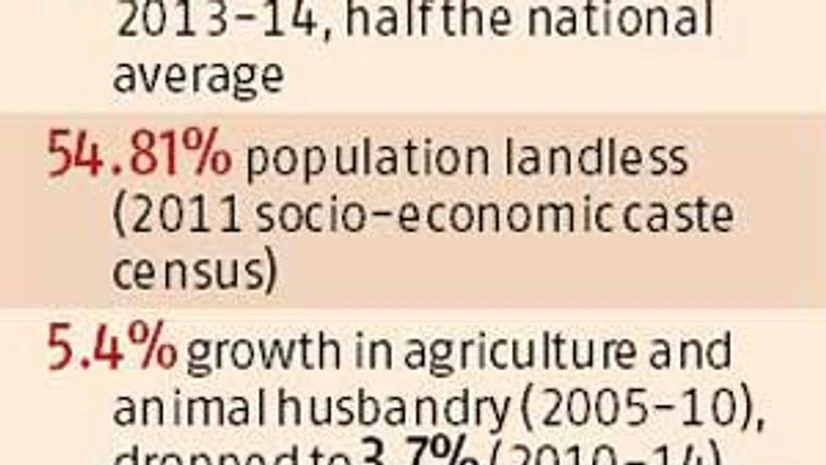National Highway 80, which connects Patna to the city of Bhagalpur, considered the hub of trade and commerce in Bihar, has potholes big enough for a small hatchback to fall into. As one attempts to head towards the industrial town of Kahalgaon, 30 km from Bhagalpur, there are worse examples of ineffectual governance. The Nitish Kumar government had promised over Rs 1 lakh crore of investments for the town, known for its 2,350 Mw NTPC thermal power station, in 2005-06. Not one of these investments has materialised 10 years later.
The industrial landscape isn't very different in Munger, Begusarai, Samastipur, Gaya - and indeed much of the rest of Bihar. In Samastipur, while the sugar mill shutdown has left 2,000 families unemployed, poor irrigation facilities have taken a toll on its spice and tobacco cultivation. Both Prime Minister Narendra Modi and Chief Minister Nitish Kumar have promised to revive the decaying Barauni industrial belt in Begusarai and the silk trade of Bhagalpur, which is also declining.
The only noticeably thriving industry in recent years, ironically, is liquor, thanks to the relaxed excise policy that the Janata Dal (United) government has followed since 2007. The share of revenue from excise in the total revenues had nearly doubled from 10.33 per cent in 2006-07 to 18 per cent in 2014-15. There have been protests against the increase in liquor licences in rural areas from 779 a decade ago to 2,360 now. These shops are some of the first to open every morning in rural areas, and at times country-made liquor is also sold from nearby provision stores. Big distillers like United Breweries, Cobra and Carlsberg have set up distilleries near Patna in recent years.
"Such has been the aversion to alcohol that in 2012-13 there were numerous instances of local women picketing liquor shops. Our publications on prohibition, particularly reprints of pamphlets written by Mahatma Gandhi, would sell in thousands," says Shahid Kamal, chief of Bihar state Rashtra Seval Dal, a Gandhian voluntary organisation. In 2012, local women picketed three liquor shops in Muzaffarpur.
The Bharatiya Janata Party (BJP) had initially planned to corner the chief minister on the issue of promoting alcohol consumption just as it put Rashtriya Janata Dal (RJD) boss Lalu Prasad on the defensive on the beef issue. A couple of months ago, Kumar succumbed to the groundswell of public opinion from women and promised to issue prohibition in Bihar if re-elected. But the BJP, according to sources, soon realised that raising the issue could boomerang, as then state Excise Minister Jamshed Ashraf later joined the BJP and the finance minister in the government was their own leader, Sushil Kumar Modi.
However, neither on the issue of alcohol, the Achilles' Heel of Kumar, nor on development has the BJP been on the offensive, limiting its propaganda to beef and jungle raj. While Prasad has found Rashtriya Swayamsevak Sangh (RSS) chief Mohan Bhagwat's remarks on reservation a stick to beat the BJP with, Kumar has surprisingly not spoken enough about the good work done by his government in improving hospitals, education and for women's empowerment.
"Unfortunately for Kumar, any improvement that he brought about was in the context of the 15 years of rule by Lalu Prasad," says Professor Anil Kumar Roy, associated with Patna-based Association for Study and Action. He says vikas or development, appears to be nobody's child in Bihar. The association, comprising serving and retired bureaucrats and academics, has conducted several seminars in recent months in small towns to raise awareness about issues of land, education and employment policy for the youth.
Bureaucrats say the government as well as the ruling party, the Janata Dal (United), is so jittery at the prospect of losing power that it is failing to suitably rebut the BJP propaganda on issues where - disaster and flood management and education for instance - its record is very good.
Economist Jean Dreze has pointed out that Bihar has cut leakages from the public distribution system, which came down from 75-90 per cent during the 2000s to less than 25 per cent in 2011-12. Bihar has managed to bring down infant mortality rates (IMR) at a faster pace than the national average. IMR is the number of dead children under one year per 1,000 live births. Although the state's IMR is still higher than all-India levels, the gap reduced after Kumar took over. The state's student retention rates, especially for primary and secondary students, have improved after the government launched the free bicycles scheme.
But this seems to be the government's best kept secret in the election season.

)
